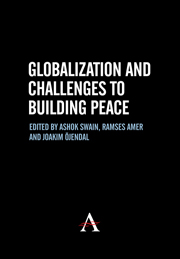Book contents
- Frontmatter
- Contents
- Acknowledgements
- List of Contributors
- 1 Building Peace in the Era of Three Waves
- 2 The Problem of Peace: Understanding the ‘Liberal Peace’
- 3 Pre-emptive Self-defence New Legal Principle or Political Action?
- 4 Beyond Criminal Justice: Promoting the Rule of Law in Post-Conflict Societies
- 5 Peace by Pact: Data on the Implementation of Peace Agreements
- 6 Refugee Repatriation as a Necessary Condition for Peace
- 7 Catapulting Conflicts or Propelling Peace: Diasporas and Civil Wars
- 8 UN Peace Operations as Norm Entrepreneurs: The Challenge of Achieving Communicative Action on Human Rights
- 9 To Practice What They Preach: International Transitional Administrations and the Paradox of Norm Promotion
- 10 Re-examining the Roots of War in West Africa in a Globalizing World
- 11 The African Union (AU) and Its Commitment to Non-Indifference: Can the AU be an Actor for the Promotion of Human Security?
- 12 Hamas Between Sharia Rule and Demo-Islam
- 13 Environmental Scarcity and Intrastate Conflicts: The Case of Nepal
- 14 Narcotics: The New Security Threat for China
- References
- Bibliography
1 - Building Peace in the Era of Three Waves
Published online by Cambridge University Press: 05 March 2012
- Frontmatter
- Contents
- Acknowledgements
- List of Contributors
- 1 Building Peace in the Era of Three Waves
- 2 The Problem of Peace: Understanding the ‘Liberal Peace’
- 3 Pre-emptive Self-defence New Legal Principle or Political Action?
- 4 Beyond Criminal Justice: Promoting the Rule of Law in Post-Conflict Societies
- 5 Peace by Pact: Data on the Implementation of Peace Agreements
- 6 Refugee Repatriation as a Necessary Condition for Peace
- 7 Catapulting Conflicts or Propelling Peace: Diasporas and Civil Wars
- 8 UN Peace Operations as Norm Entrepreneurs: The Challenge of Achieving Communicative Action on Human Rights
- 9 To Practice What They Preach: International Transitional Administrations and the Paradox of Norm Promotion
- 10 Re-examining the Roots of War in West Africa in a Globalizing World
- 11 The African Union (AU) and Its Commitment to Non-Indifference: Can the AU be an Actor for the Promotion of Human Security?
- 12 Hamas Between Sharia Rule and Demo-Islam
- 13 Environmental Scarcity and Intrastate Conflicts: The Case of Nepal
- 14 Narcotics: The New Security Threat for China
- References
- Bibliography
Summary
Introduction
During the last few decades, the nature of peace and development in the international system has shifted considerably so has the measures applied in support of those values. Whereas ‘war’ has structurally shifted from being interstate concern to becoming intrastate in nature, ‘development’ has moved from one of typically defining national development strategies to one of tapping into a neo-liberal global order in the most efficient way possible. As such, the values and processes of, and measures to support, peace and development have, to a large extent, conflated. Moreover, internal war is typically founded in a particular political economy further feeding – or even being the origin of – conflicts; adaptation to the neo-liberal globalization has, on the other hand, turned ‘development’ into a conflict prone process, marginalizing large number of people. Globalization which – for good and bad – is driving the processes described above will not fade within the foreseeable future, but rather it is likely that the trend will increase in the decades to come. While undeniably, this shift in ‘order’ has brought some positive values, globally the problems may be even more severe, including the creation of social and internal conflicts, ethnic strife, political instability (often related to democratization), pauperization, forced migration and rampant natural resource extraction with severe livelihood losses for millions, just to mention a few of the far too prevalent problems.
- Type
- Chapter
- Information
- Globalization and Challenges to Building Peace , pp. 1 - 16Publisher: Anthem PressPrint publication year: 2007



